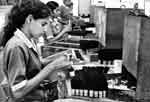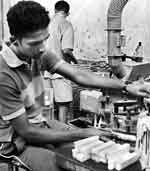|
Making brushes with care and perfection - Special facilities for handicapped workers at Harris
Ever wondered how a paint brush is made or that brush making has become a craft that is being passed on from generation to generation? Well, these are some of the amazing facts that were learnt during a visit to the factory of Harris Ceylon Limited, located at Meegoda. It was as far back as 1935 that Sri Lankans were first introduced to Harris brushes when W.D. Carolis began to import them from L.G. Harris Ltd in the United Kingdom. Undaunted by the import ban of 1969, he set up Harris Ceylon Ltd in conjunction with the mother company in the UK. His successors were C.G.D. Carolis and Michael Dias, father of the present Managing Director Sujan Dias.
For nearly 40 years, Harris has gradually worked at establishing itself in Sri Lanka. Now the company is a household name synonymous with paint brushes. On hindsight, the decision W. D. Carolis made has proven to be invaluable given that only a handful of other countries (China and Kenya) have the privilege of manufacturing Harris brushes. It has given Sri Lankans the chance to purchase these brushes at affordable prices and also to be part of a great industry. A tour of the Harris factory, starting outside, at the sheds with wooden planks used to make handles and finishing off at the stores, from where the finished product is distributed, gives one a good idea as to what goes into the production of a paint brush. “We believe in maintaining our quality and therefore it is all done under one roof, without outsourcing,” said Narada Amaratunga, Production Manager at Harris Ceylon Ltd.
In fact, the rubber wood treated with chemicals is the only thing that is outsourced in this factory. While their primary provider is Panawatta Plantations belonging to the Hayleys group, there are other suppliers as well. It is ensured that all wood planks used at the factory are up to the standard maintained by Harris brushes internationally. As you enter the factory the loud roar of the huge cutting machine greets you. It is these cutting machines that cut the planks to make brush handles of different sizes. And following these, all you see, up to the other end of the building are various machines that contribute at different stages of the production process. “Ninety per cent of these machines are imported, mainly from the UK and at least 80 per cent of the production process has been automated,” said Amaratunga, barely audible over the racket of one machine trying to outdo the other. Each machine is supervised by the factory staff who keeps a close watch over the metal beasts. The raw handles are sent through the sanding machine and varnished and painted with the trademark colours of Harris, the familiar red and white. Then the handles are stamped with the Harris logo. Amaratunga noted that the stamp and the paint cannot be duplicated because they come from the mother company in the UK. Although the paint used was said to be environmental friendly, the workers wore masks for extra precaution. In addition to paint brushes, wire brushes are also manufactured but with the high demand there is to be met in the case of paint brushes, the factory tends to concentrate more on them than any other brushes. They work according to a monthly production forecast. In addition to the automated brush making and assembling process, there is something very interesting going on; manual brush making. The manual brush makers are a select group of veterans of the craft, about five or six people out of the 125 factory workers. Their efficiency is evident in their workmanship. One reason for manual brush making is that some of the sizes cannot be made by the machines. But most importantly, to most workers at Harris Ceylon Ltd, brush making is a tradition. It has been passed on from mothers to daughters and at this juncture, an interesting observation could be made. The administration of Harris Ceylon has come down from generation to generation and most employees have also followed suit. As most employees are from the town of Meegoda, for them, it is a craft rather than a mere job. Therefore, you see different generations from families working in unison, with trade secrets being passed down from mother to daughter. “It is like a family and it is very good to work here,” said Rozanna De Alwis, a Supervisor at the factory. Her loyalty to the company is apparent because she started working for the company as a 19-year old in 1968, and after being abroad for a few years she once again returned to Harris. She has no regrets about it and calls it “the best place you can work at.” Another outstanding attribute is that even supervisors like her were seen working together with the staff on the same level, proving De Alwis’s words that they are a family unit. The highlight of the production process is what you could call Harris’ secret formula. It is a special glue that guarantees against bristle loss. This is an advantage that Harris Ceylon Ltd has because they received technical know how from the mother company. The bristles are imported from China. Although Harris is marketing synthetic bristled brushes such as the new No Loss range, they are still not manufactured in the factory. Next, the brushes are put through trimming and during this any loose bristles are removed. These waste bristles are not thrown away. There’s another machine called the turning machine in which collected waste bristles are turned and readied to be re-used. The handles and bristle heads are joined manually and they are rammed together by nailing or stapling, depending on the type of brush. Then the finishing touches are added by cutting the odd pieces off and by combing through the bristles to check for bristle loss one last time. Another group of veterans perform a task known as quality check. Their job is to spot any shortcoming the brushes may have which would prevent them from reaching the international standard Harris aims at. It is fascinating to watch their ability to spot a flaw at a glance. Despite the high local demand, the brushes made in Sri Lanka are exported to the UK, the Middle East, Maldives and Hong Kong. Currently there’s a blind couple and also a blind young man working for the packing section. It is part of the company policy to help the community. There are steel railings in the factory, including the lavatories for the blind workers to find their way around the premises. The factory also helps maintain the train station that runs right in front of the factory and looks after the needs of the staff such as medical requirements and transport. The factory of Harris Ceylon Ltd shows that the driving force behind its success is the employees whose loyalty to the factory as well as the craft of brush making is obvious. Disna Damayanthi, who was multi-faceted, not only at brush making but also at working and talking at the same time said, “We are treated very well and in return, we do our part”. These sentiments were reflected in the words of the company’s Managing Director Sujan Dias. “To be able to produce a product of that high quality, you have to be genuinely interested in what you are doing.” Harris Ceylon Ltd shows that in today’s
business oriented culture, there are factories where there is good
rapport between the employers and the employees and genuine interest
in the product they are manufacturing.
|
||||
Copyright © 2006 Wijeya Newspapers
Ltd. All rights reserved. |

